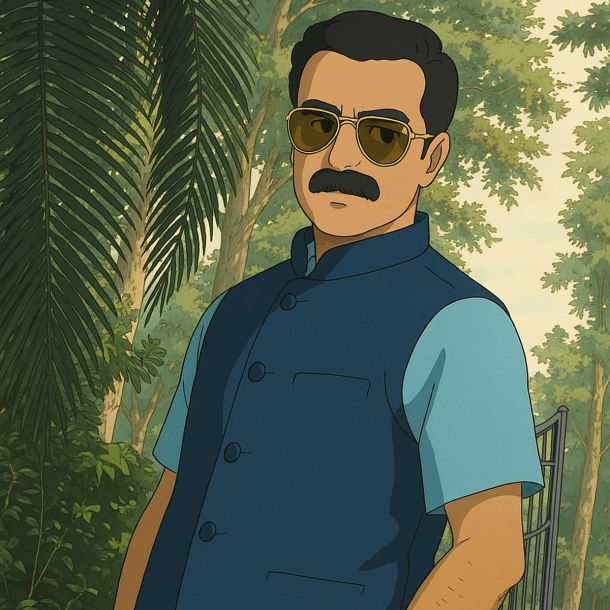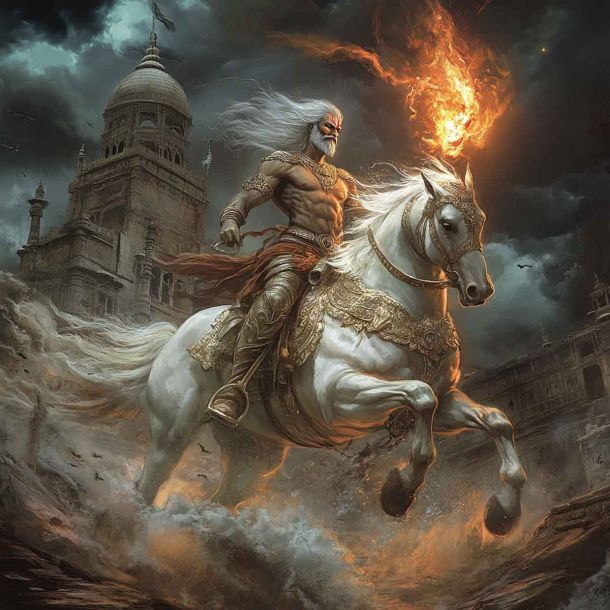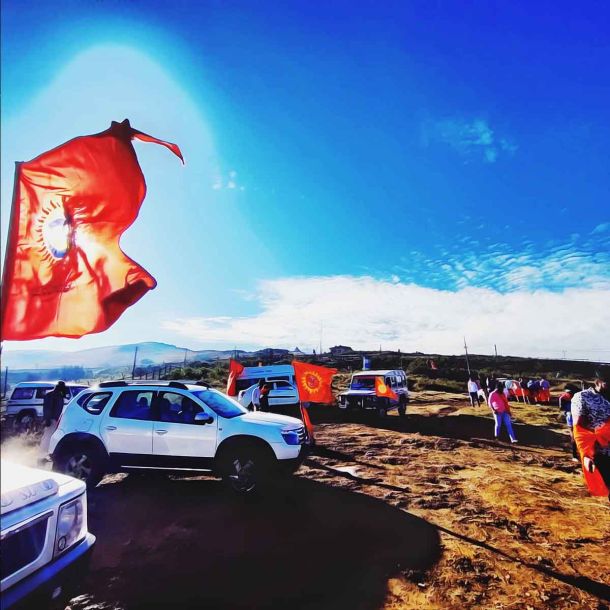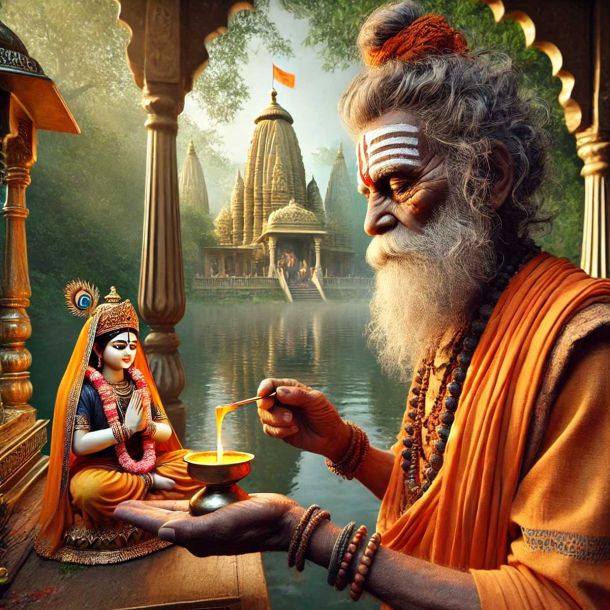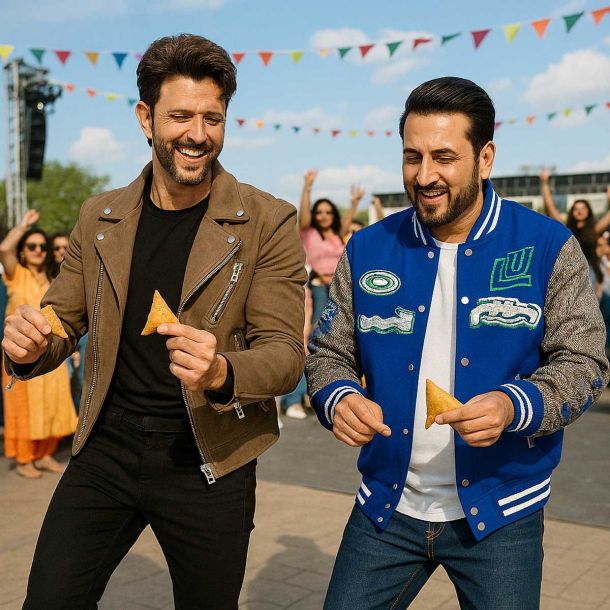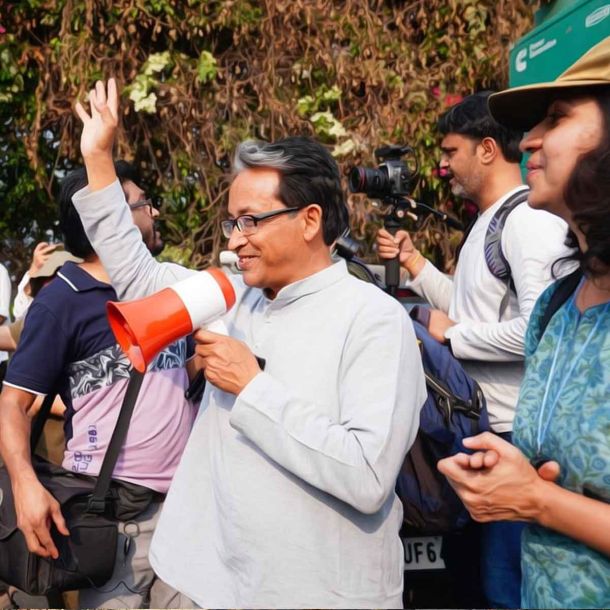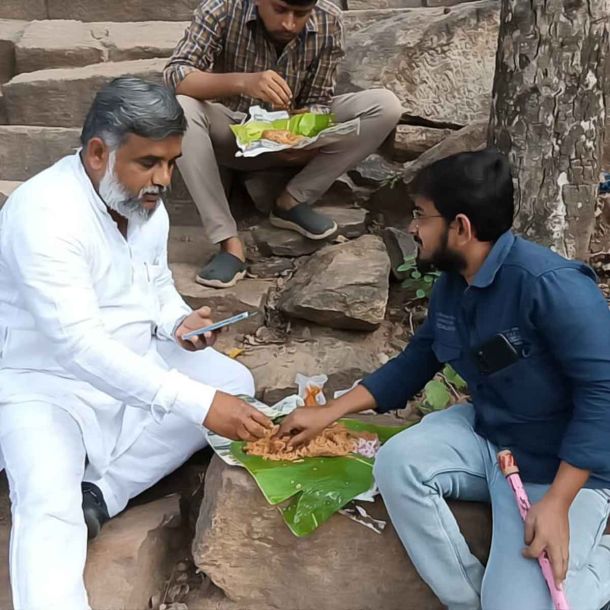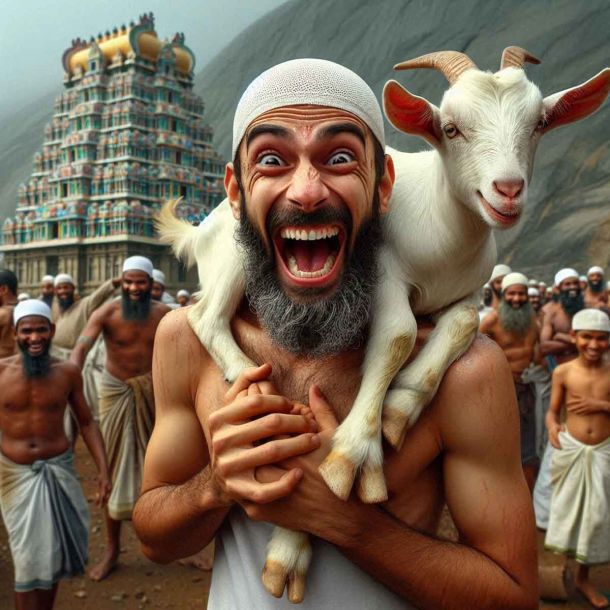More Coverage
Twitter Coverage
Satyaagrah
Written on
Satyaagrah
Written on
Satyaagrah
Written on
Satyaagrah
Written on
Satyaagrah
Written on
Join Satyaagrah Social Media
Dwarkadhish Temple in Dwarka - The Magical Land of Lord Krishna
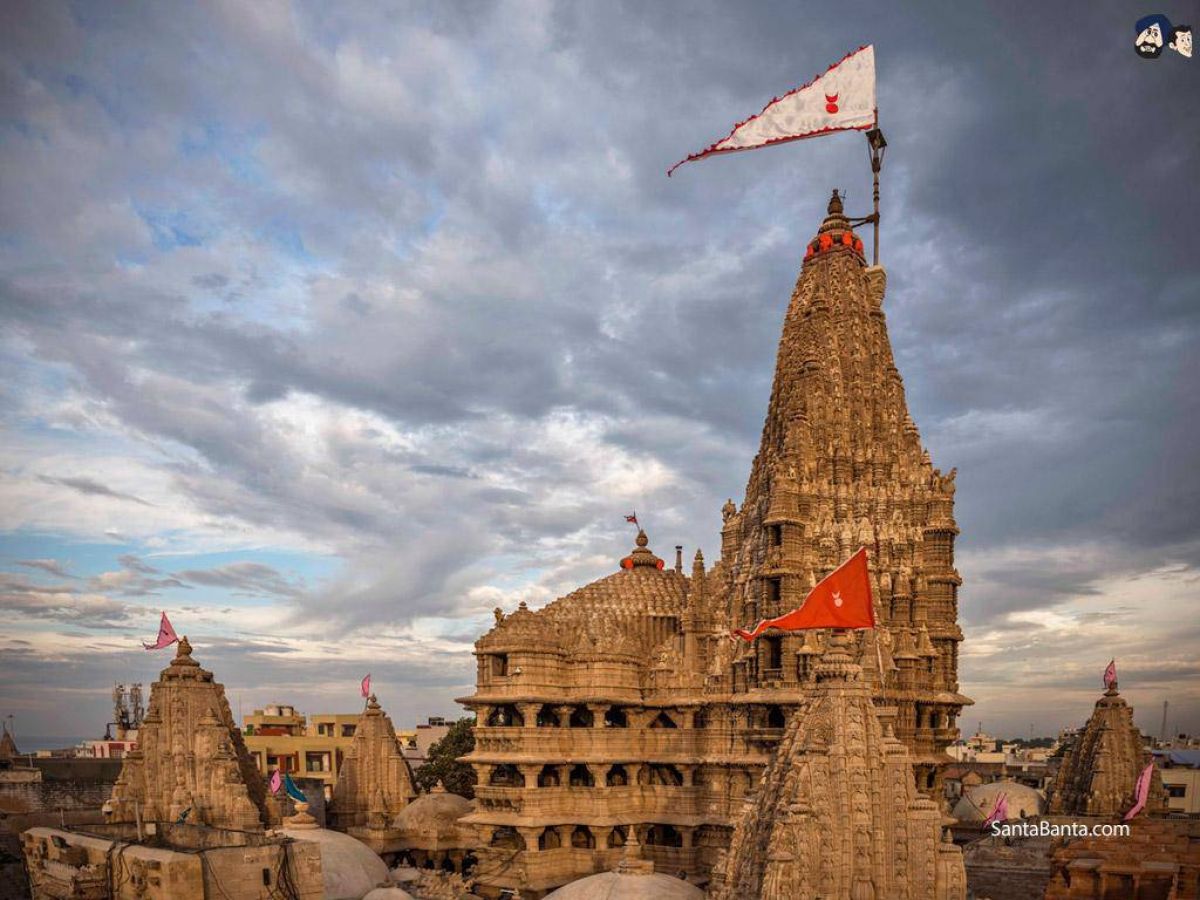
One of the most visited Hindu pilgrimage temples in India, Dwarkadheesh Jagat Mandir, is considered as one of the four Dham (divine abodes) in India.' The literal of Dwarka signifies 'Gate to Liberation'- 'Dwara' meaning door and 'ka' implying eternal happiness. The penetrated Dwarkadheesh temple nestles between the ocean coast and the town of Dwarka.
Images
View the embedded image gallery online at:
https://mail.satyaagrah.com/sanatan/temple/273-dwarkadhish-temple-in-dwarka-the-magical-land-of-lord-krishna#sigProId0d29af9eee Related Tweets@DograTishaa
@desi_thug1
@banarasivikas
@GujaratHistory
|
Legend has it that Lord Krishna shifted his capital from Mathura to Dwarka because 9KamsaJarasandha, who wanted to avenge the death of his son in law (Kamsa), repeatedly attacked Mathura. During the 18th attempt by Jarasandha, Krishna chose to leave Mathura with the Yadav dynasty. Dwarka, as a site for the capital, was chosen by Garuda, the divine eagle, to bring Krishna when he departed from Mathura. Krishna then besieged Vishvakarma to help him build his new capital. Vishvakarma agreed to help only on one condition that Samudradev, the god of the sea, should provide the land. Krishna then offered prayers to Samudradev and was blessed with a land that measures 12 yojanas (773 sq km). He then founded his kingdom in Dwarka and stayed there for the rest of his life.
Who Built Dwarkadhish Temple and When?
It was built by Vajranabh, the great-grandson of Sri Krishna. This is where the Hari Griha or the home of the Hari or Krishna once stood, making this land holy. The main shrine of the five-storied building, supported by 72 pillars. Archaeological findings suggest it to be 2,000 - 2,200 years old.
Following are the main architectural features of Temple:
- Dwarkadhish is a seven storey temple, supported on seventy-two pillars.
- Dhwaja, the temple flag, spans 84 feet high and is hosted on top of a pillar that is 20 feet high. It bears the emblem of the sun and the moon and can be seen in the various combination of pink, red, saffron, yellow, white, blue and green. Colours of the flags are chosen as per the different days of the week and each stands for a specific spiritual quality.
- Two entrances will lead tourists to the temple. Main entrance towards the north is called "Moksha Dwara" (Door to Salvation), this door takes one to the main market. Another gate towards the South is called "Swarga Dwara" (Gate to Heaven).
- Spire of the temple is 78.3 m high.
Mandapa
Mandapa
The Mandapa has a tiered Shikhara – something that we see in many temples of Gujarat, including Jain temples. It stands on 72 pillars all of which are carved of a single stone. This has four stories and interpreted as a representation of Char Dhams or the 4 most important Vaishnava temples in four corners of India. Dwarka is one of the 4 Dhams located in the western corner of India. The other 3 are Rameswaram in the South, Jagannath Puri in East and Badrinath in North.
4th Storey has a temple dedicated to Chalati Mata and 5th one has Ladwa temple. The general public is not allowed to go up and their movements are restricted to the ground floor only.
Solanki Style
Solanki Style
The architecture is in general Solanki style that was prevalent in Gujarat for a long time. A Solanki typical temple plan consists of a closed hall (‘sanctum’) and a porch that are inter-connected both internally and externally. A detached peri-stylar hall is added in larger temples in the same axis, which is often preceded by a ‘torana’ or ornamental arched entrance.
As per the archaeologists, the main temple can be attributed to 12-13th CE while the Sabha Mandap, also called Ladwa Mandap can be attributed to 15-16th CE. The excavations around the temple complex have revealed that this is the 4th temple, in the same place. The earliest temple would go back to at least 2200 years ago.
Legend of Murti
Legend of Dwarkadish Murti at Dwarka
2.25 feet in high carved black stone Murti that we see in the Dwarkadish Temple today is the 3rd Murti in this temple. The first Murti that is believed to be worshipped even by Rukmini, the first queen of Krishna is now in Beyt Dwarka temple. It was taken there to protect it from the foreign invaders.
The second Murti is at a temple in Dakor. The story goes that there used to be a girl named Badana who used to come to Dwarka from Dakor. Pleased with her devotion one day Sri Krishna decided to go with her. The priests however suspected that the girl has stolen the idol. They chased her. The girl paid them with the gold she had and took the idol with her. This is how the original idol reached the temple at Dakor.
Priests at Dwarka had the epiphany that there is another Murti of Sri Krishna at Savitri Talaav. They dug the place in a hurry and out came the incomplete idol. The eyes were not yet formed. This is the current image of the Lord of Dwarka that is worshipped.
Another view says that the Murti was hidden in the Savitri Talaav to keep it safe from the repeated attacks by the invaders. You can not make out the missing eyes as the Shringar or Make-up takes care of that very well. Krishna faces the western direction, an unusual direction but maybe was looking at the sea which has his submerged city under its waves.
Dwarkadhish Temple is also home to one of the 4 Shankaracharya Peethas – Sharda Peetha. The other three are Jyotish Math at Badrinath, Sringeri Math in Karnataka and Govardhan Math in Puri in Odisha. Sharda Peeth part of the temple is a new construction dedicated to Adi Shankaracharya. In the mornings and evenings, you can see the hear the students chanting Vedic chants in Sanskrit. Of the 4 Vedas, Dwarka’s Sharda Peeth has Saam Veda, and you can hear its chanting.
Dhwaja Arohan or Flag Changing Ceremony
Wherever you look at the Dwarkadish temple, you can not miss the huge fluttering flag on top of its Shikhara. You would also notice that there is a different flag every time you look at the temple. Well, the flag is changed 5 times a day – thrice in the morning hours and twice in the evening.
It is not just a change of flag, it is a huge ceremony. The family sponsoring the flag feeds all the Brahmins of Dwarka followed by elaborate Puja. They bring the flag to temple singing and dancing, carrying it on their heads. The flag is offered to the deity after which a member of the Brahmin community goes up and changes the flag. There is a waiting period of 2 years if you want to sponsor a flag change.
Such an important flag must come with lots of rules. The flag measures 52 yards or 40 meters – yes, it is a huge flag. 52 smaller flags are attached to the large flag representing the 52 officers of Dwarka or 52 sub-castes of Yadavas. Another theory says 52 represents the 12 zodiac signs, 27 Nakshatras, 10 directions, Sun, Moon & Sri Dwarkadish. Yet another theory says that it represents the 52 doors that Dwarka had once upon a time. Remember, it was also called Dvaravati or the city of beautiful doors.
The flag can be any color or a combination of colors except the black color. The flag has an emblem of sun and moon on it. There are special tailors to stitch the flags of the temple.
When the flag is being changed, everyone stops to look at the new flag flutter.
Festivals celebrated in this temple
Janmashtami is the birthday of Lord Krishna, and is the most important festival of the Dwarkadhish Temple. Rukmini Vivah is an interesting festival held in March that celebrates the wedding of Krishna and Rukmini. Other festivals celebrated here are Holi, Ram Navami, Basant Panchami, Deepawali and Sharad Purnima. The temple is open from 6 am to 1 pm and 5 pm to 9:30 pm.
Photography is not allowed inside the temple. Digital devices have to be kept away in lockers before you enter the shrine. You can find many dharamshalas located around the temple.
Other Temples in the complex
As you enter from the Moksha Dwar, on your right you see: Kusheshwar Mahadev – A small Shiva temple with a Lingam a story down from the temple ground is the first temple that you meet if you enter the temple from the Moksha Dwar or Northern Gate. Dwarka was known as Kushasthali and I assume Kusheshwar Mahadev must have been its presiding deity. He continues to be worshipped even today.
Navgrah Yantra
On the other side of the entrance is Kashi Vishvanath Shivalinga, Gayatri Devi Temple along with the temple dedicated to Kolva Bhagat.
Around the main temple are temples dedicated to:
Aniruddha and Pradyumna Temple
- Rishi Durvasa Temple – Kul Guru of Krishna
- Amba Ji Temple – Kul Devi of Krishna
- Devaki Temple – Krishna’s mother. Her temple is bang opposite the Garbh Griha as if she is overlooking her son all the time.
Radha Krishna Temple
Beni Madhav, Purushottam Rai & Balram Temples.
Pattarani Mahal – this is a separate structure with a courtyard in the middle. There are small temples in all the walls dedicated to Jambavati, Radhika, Saraswati, Laxmi, Satyabhama, Mahalaxmi Narayan & Bal Gopal.
Shakti temple or Chalati Mata temple on the 4th floor that is inaccessible to the public.
Shankaracharya Samadhi in the form of Paduka.
 Support Us
Support Us
Satyagraha was born from the heart of our land, with an undying aim to unveil the true essence of Bharat. It seeks to illuminate the hidden tales of our valiant freedom fighters and the rich chronicles that haven't yet sung their complete melody in the mainstream.
While platforms like NDTV and 'The Wire' effortlessly garner funds under the banner of safeguarding democracy, we at Satyagraha walk a different path. Our strength and resonance come from you. In this journey to weave a stronger Bharat, every little contribution amplifies our voice. Let's come together, contribute as you can, and champion the true spirit of our nation.
 |  |  |
| ICICI Bank of Satyaagrah | Razorpay Bank of Satyaagrah | PayPal Bank of Satyaagrah - For International Payments |
If all above doesn't work, then try the LINK below:
Please share the article on other platforms
DISCLAIMER: The author is solely responsible for the views expressed in this article. The author carries the responsibility for citing and/or licensing of images utilized within the text. The website also frequently uses non-commercial images for representational purposes only in line with the article. We are not responsible for the authenticity of such images. If some images have a copyright issue, we request the person/entity to contact us at satyaagrahindia@gmail.com and we will take the necessary actions to resolve the issue.
Related Articles
- Lakshmi Narasimha Swamy Temple, Antarvedi, Andhra Pradesh
- Jagannath Temple administration issues clarification on proposed sale of temple lands
- Here is the truth about the land deal by Ram Janmabhoomi Teerth Kshetra and how the allegations by likes of AAP are baseless
- Biggest Wonder of the World : Kitchen of Lord Shri Jagannath
- Yes, Secular India’s shift towards ‘Majoritarianism’ is very much real: So, just deal with it
- Srikalahasti Temple, Dakshina Kailash
- Culture And Heritage - Meenakshi Temple Madurai
- Why Hindus not claiming their temples back from the Government control: Is pro-Hindu govt will always be in power
- Narasimha Rao govt brought places of Worship Act as a hurdle in reclaiming ancient Hindu heritage destroyed by Muslim invaders
- Indian govt won’t be any different from British if Hindus can’t manage their own temples
- PM Narendra Modi inaugurated the Statue of Equality of Sri Ramanujacharya and emphasized 'Progressiveness does not mean detaching from one’s roots and that there is no conflict between progressiveness and antiquity.'
- BJP’s aim to restore the Sanatan faith, glorious history and pride of India: ‘How can Mathura-Vrindavan be left behind,’ says Yogi Adityanath ahead of visiting Krishna Janmabhoomi
- Shri Murudeshwar Temple: Home To The World’s Second Tallest Shiva Statue
- “The bigmouths never visited Lord Ram’s birthplace and kept on playing politics”: Ram Mandir chief priest says only BJP cares about Ram Mandir, Modi did Shilanyas and CM Yogi visited 40 times
- Proud Kalyan Singh refused to give orders to shoot Karsevaks and chose to resign as CM of UP instead: Karsevaks not only reached atop the dome but had also started breaking it, where Ram Mandir stands today
